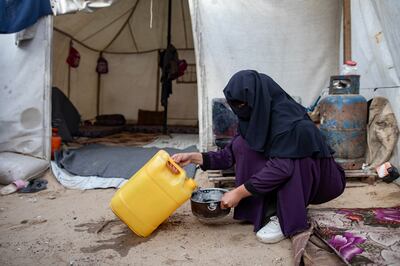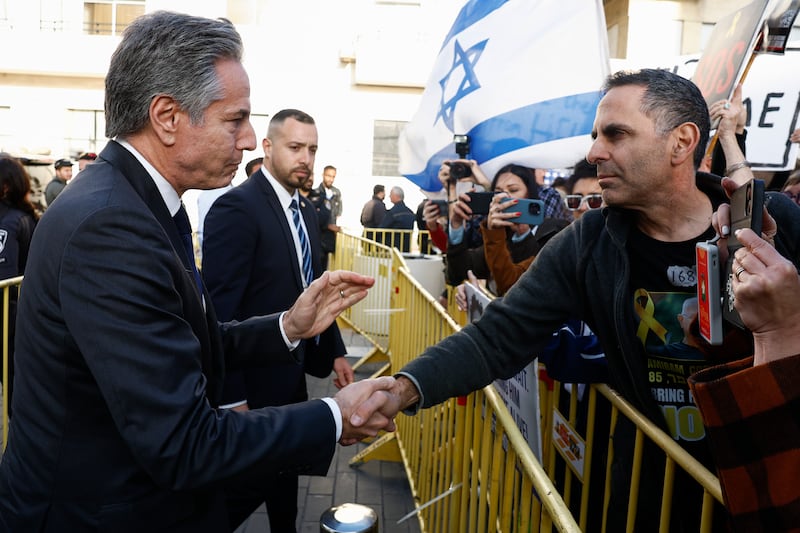Live updates: Follow the latest news on Israel-Gaza
The UAE, Saudi Arabia, Jordan, Egypt and Qatar called for the opening of all Gaza border crossings for aid on Friday, as US Secretary of State Antony Blinken finished his trip to Israel to try to secure a deal to pause the fighting in the ravaged Palestinian enclave.
Mr Blinken met Israeli Prime Minister Benjamin Netanyahu on Friday during his sixth visit to Israel since the war in Gaza began in October.
The Secretary of State said he emphasised “the need to protect civilians in Gaza and increase and sustain humanitarian assistance, including through both land and sea routes.”
His trip has aimed to urge Mr Netanyahu to halt plans for a ground operation in Rafah, southern Gaza, where about 1.5 million people are sheltering from Israeli bombardments.
Speaking at the airport as he left Israel, Blinken told reporters he had “candid conversations” with Mr Netanyahu and that a military operation in Rafah “risks killing more civilians”.
“It risks wreaking greater havoc with the humanitarian assistance. It risks further isolating Israel around the world and jeopardising its long-term security and standing,” he said.
However, Mr Netanyahu said he had told Mr Blinken that while he appreciated US support for Israel's war against Hamas, it was necessary to go into Rafah to destroy the group, with or without American backing.
“I told him that I hope we would do this with US support but if necessary, we will do it alone,” Mr Netanyahu said on X.
Mr Blinken's visit comes after a joint statement published on Friday said the foreign ministers of the UAE, Saudi Arabia, Jordan, Egypt and Qatar stressed the “urgent need to achieve a comprehensive and immediate ceasefire” at a meeting with Mr Blinken in Cairo.
They called “for the opening of all border crossings between Israel and the Gaza Strip to allow for the delivery of humanitarian assistance”, and the removal of “all barriers imposed by Israel that obstruct the flow of aid to more than two million Palestinians facing famine in Gaza”.
Nearly 32,000 Palestinians have been killed in the Gaza war, with more than double that number injured.
The US and regional allies continue to push for a deal to release Israeli hostages held in Gaza, most of them abducted in the Hamas attack on southern Israel on October 7.

Hamas has called for the release of Palestinian detainees in Israeli jails and the withdrawal of Israeli forces from Gaza.
Following initial hopes for a six-week ceasefire deal before the beginning of Ramadan, reports suggested that talks had stalled amid intense diplomatic pressure on both sides to reach an agreement.
Mr Netanyahu approved an Israeli delegation to travel to Qatar on Friday for ceasefire talks, his office said on Thursday evening.
The delegation, led by Mossad chief David Barnea, will meet CIA chief William Burns, Qatari Prime Minister Sheikh Mohammed bin Abdulrahman and Egyptian Intelligence Minister Abbas Kamel “to promote the release of the hostages” in Gaza, it said.
“The meeting of senior officials will take place as part of the negotiations in Doha and its purpose is to advance the efforts to return the abductees,” Mr Netanyahu's office said.
An Israeli delegation left Qatar this week amid continued negotiations to secure a pause in almost six months of fighting.
The Qatari Foreign Ministry later said technical talks were continuing and Doha remained “cautiously optimistic”. But the ministry said it was too early to talk of a breakthrough.
US President Joe Biden is reportedly becoming increasingly frustrated with Mr Netanyahu, who faces criticism at home for not prioritising the freeing of hostages, which much of Israel’s far-right government say will hurt the country’s war effort.
Mr Blinken said on Thursday in Cairo that he believes talks in Doha could still bring about a ceasefire.
“Negotiators continue to work. The gaps are narrowing and we are continuing to push for an agreement in Doha. There is still difficult work to get there. But I continue to believe it is possible,” Mr Blinken said.
“We have closed the gaps but there are still gaps. So I can’t put a timeline on it. I can just say that we are committed to doing everything possible to reaching an agreement.”

As Mr Blinken met Mr Netanyahu, the UN Security Council voted to reject a US-drafted resolution that had noted the need for an “immediate” ceasefire that would allow in more aid into Gaza.
Russia, China and Algeria voted against the draft resolution, which received 11 votes in favour and one abstention.
China's UN ambassador, Zhang Jun, told council members the US draft was “very unbalanced”, particularly on Israel's plans for a military offensive on Rafah.
He noted the draft did not “clearly and equivocally state its opposition, which would send the wrong signal and lead to severe consequences”.
“Any action taken by the Security Council should stand the test of history, under scrutiny of morality and conscience,” the Chinese envoy added.
Russia's deputy UN ambassador Dmitry Polyanskiy previously told reporters in New York “anything that doesn't call for a ceasefire” would not suffice.
Arab nations, led by Algeria, put a draft resolution to a vote last month with little expectation it would pass after the US said it would present a rival draft.
US and other western officials have been increasingly critical in public statements of Israel’s conduct during the war, a noticeable contrast to their overwhelming support in the early months of the fighting.
Canada this week said it would honour a non-binding motion to halt all future military exports to Israel.
The move was criticised across the political spectrum in Israel where it raised fears that other western countries, including the US, which is by far Israel’s largest supplier of weapons, could follow suit.







